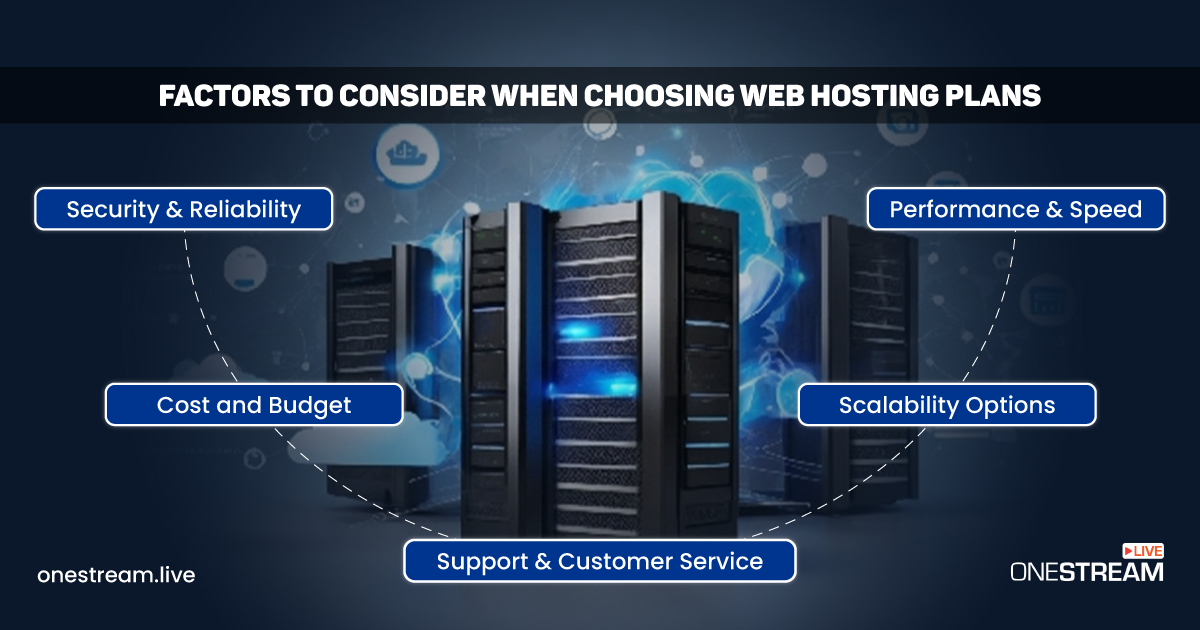Choosing the right web hosting plan for your business is a crucial decision that can have a significant impact on your online presence and success. With a plethora of options available in today’s competitive market, it can be overwhelming to navigate through the various features, pricing structures, and technical specifications. However, by understanding the specific needs your business and evaluating key factors such as reliability, scalability, security, and support, you can make an informed decision that aligns perfectly with your goals. In this guide, we will explore the essential considerations and provide expert advice to help you choose the right web hosting plan that will support your business needs and drive growth in the online world.
In this Article:
Understanding Your Business Needs
When selecting the right web hosting plan for your business, a crucial first step is understanding your specific requirements and goals. This involves assessing your website’s needs and considering how they align with different hosting options. Here are two key elements to consider:
Assessing Your Website Requirements
Your website’s requirements are the foundation for choosing an appropriate hosting plan. To make an informed decision, delve into the following areas:
- Traffic Volume: Begin by estimating your website’s current and expected traffic. Are you running a small blog with a handful of visitors, or is your website an e-commerce platform hoping for high traffic during peak seasons? Understanding your traffic patterns is essential in selecting a plan that can handle your visitor volume without slowdowns or downtime.
- Content-Type: Consider the nature of your website’s content. Are you primarily hosting text-based content, or do you have multimedia elements like images, videos, or interactive features? Content-rich websites may require more storage and bandwidth to deliver a seamless user experience.
- Functionality: Evaluate the functionality of your website. Are you running resource-intensive applications, e-commerce scripts, or content management systems (CMS)? Different web applications have varying resource requirements, and your hosting plan should support the technologies you use.
Scalability and Growth
While your current needs are important, it’s equally essential to plan for the future growth of your business with managed hosting. Scalability is the ability to upgrade your hosting resources as your website expands seamlessly. Here’s why it matters:
- Future Expansion: Consider where your business will be in the coming months or years. A successful website will likely see increased traffic and content over time. Ensure that your hosting plan can accommodate this growth without causing performance issues.
- Seasonal Traffic: If your business experiences seasonal fluctuations in traffic, consider how your hosting plan can adapt during peak periods. Scalable hosting allows you to allocate more resources during busy seasons and scale down during quieter times, helping you manage costs efficiently.
By assessing your website’s current needs and planning for scalability and growth, you’ll be better equipped to choose a web hosting plan that aligns with your business objectives and ensures a smooth online presence.
Types of Web Hosting Plans
Once you clearly understand your business needs, it’s time to explore the various types of web hosting plans available. Each class offers unique features and capabilities tailored to different requirements. Here are the primary web hosting options to consider:
Shared Hosting
Shared hosting is ideal for small to medium-sized websites with modest traffic and resource demands. In this hosting environment, hosting involves multiple websites sharing the same server resources, including CPU, RAM, and storage. It’s a cost-effective option as hosting providers split the server costs among users.
- Benefits: Shared hosting is budget-friendly, making it an excellent choice for startups and personal blogs. It’s easy to set up, requiring minimal technical expertise. Hosting providers typically handle server maintenance and updates, offering a hassle-free experience.
- Limitations: Due to shared resources, performance can be affected by other websites on the same server. Your website’s speed and reliability may vary depending on server load and traffic spikes.
Virtual Private Server (VPS) Hosting
Virtual Private Server (VPS) hosting balances shared and dedicated hosting, offering more control and resources. VPS hosting divides a physical server into multiple virtual servers, each with dedicated resources. Users enjoy greater isolation and customization options compared to shared hosting.
- Suitable Use Cases: VPS hosting is ideal for growing websites that require more resources, enhanced performance, and greater control. It’s an excellent choice for businesses that need to run custom applications or host multiple websites.
- Advantages: VPS hosting provides better performance and reliability compared to shared hosting. Users can configure their virtual servers, install custom software, and allocate resources according to their needs.
Dedicated Server Hosting
Dedicated server hosting is designed for websites with high resource demands and performance requirements. With dedicated hosting, you have an entire physical server dedicated exclusively to your website. This ensures complete control over resources, performance, and security.
- Suitable for Businesses: Dedicated hosting is typically chosen by large businesses, e-commerce platforms, and websites with heavy traffic or resource-intensive applications.
- Advantages: Dedicated servers offer unparalleled performance, security, and customization options. You have full control over server configurations, making it suitable for complex web projects.
Cloud Hosting
Cloud hosting is a dynamic and flexible hosting solution that leverages a network of interconnected virtual servers. Cloud hosting utilizes a network of virtual servers (the cloud) to distribute resources dynamically.
- Flexibility and Benefits: Cloud hosting is known for its flexibility. It allows users to scale resources up or down as needed, making it an excellent choice for websites with fluctuating traffic.
- Benefits: Cloud hosting offers high uptime, as resources are distributed across multiple servers. It’s cost-effective, as users only pay for the help they consume. Cloud hosting suits businesses of all sizes, from startups to enterprises.
Understanding the various web hosting options is crucial in making an informed decision that aligns with your business requirements and goals. Each type of hosting plan has its unique advantages and limitations, and choosing the right one will play a pivotal role in your online success.
Factors to Consider
Several critical factors come into play as you evaluate web hosting plans for your business. Taking these factors into consideration will help you make an informed decision that aligns with your specific needs and goals:
Performance and Speed
- Importance of Fast Loading Times: Website speed is paramount in today’s digital landscape. Users expect websites to load quickly, and search engines consider loading times when ranking sites. Opt for a hosting plan that ensures fast page loading speeds, contributing to a positive user experience.
- Server Performance: Assess the hosting provider’s server performance and infrastructure. Look for features like SSD storage, high-performance hardware, and content delivery networks (CDNs) to boost website speed and performance.
Security and Reliability
- Significance of Security Features: Security is non-negotiable for any business website. Ensure the hosting plan includes robust security features such as firewalls, DDoS protection, malware scanning, and regular security updates.
- Uptime Guarantees: Downtime can lead to lost revenue and damage your online reputation. Choose a hosting provider with a strong uptime guarantee (99.9% uptime or higher) to keep your website accessible to users around the clock.
Support and Customer Service
- Responsive Customer Support: Business hosting plans should have responsive and knowledgeable customer support. Evaluate the hosting provider’s support channels (live chat, phone, email) and response times to ensure you can get assistance when needed.
- 24/7 Availability: Issues can arise at any time. Opt for a hosting provider that offers 24/7 customer support to address concerns promptly, even outside regular business hours.
Cost and Budget
- Budget Considerations: While cost is a factor, it should not be the sole determining factor. Balance your budget considerations with the features and resources your business needs. Remember that investing in quality hosting can lead to long-term benefits.
- Cost-Effective Options: Look for hosting providers that offer cost-effective plans without compromising essential features. Consider introductory offers, discounts, and long-term contracts that can help reduce hosting expenses.
Scalability Options
- Accommodating Future Growth: Your business may grow over time, leading to increased website traffic and resource demands. Ensure the hosting plan allows for scalability, whether the ability to upgrade to a higher-tier plan or easy integration with additional resources as needed.
- Resource Scalability: Some hosting plans offer resource scaling options, allowing you to adjust CPU, RAM, and storage resources as your website’s needs evolve. This flexibility is valuable for businesses with varying resource requirements.
- By carefully evaluating these factors, you can make an informed decision when choosing a web hosting plan that meets your current needs and supports your business’s growth and online success.
Choosing the Right Hosting Provider
Selecting the right hosting provider is critical in finding the perfect web hosting plan for your business. Here’s a step-by-step guide to help you make an informed decision:
Researching Hosting Providers
- Assess Your Needs: Before researching, determine your specific hosting requirements. Consider factors such as the type of website you’re running, your target audience, and your resource needs.
- Compile a List: Create a list of hosting providers that align with your needs. Explore both well-known providers and smaller, specialized ones.
- Check Reliability: Assess the reliability and reputation of each hosting provider. Look for providers with a track record of consistent uptime and customer satisfaction.
Reading Reviews and Seeking Recommendations
- Customer Reviews: Read customer reviews and testimonials to gain insights into the hosting provider’s performance. Pay attention to positive and negative feedback to understand potential strengths and weaknesses.
- Seek Recommendations: Reach out to peers or colleagues with web hosting experience. Recommendations from trusted sources can be invaluable in your decision-making process.
Evaluating Hosting Plans
- Compare Features: Carefully compare the features offered by each hosting provider. Assess available resources (CPU, RAM, storage), scalability options, security measures, and customer support.
- Consider Pricing: While cost is a factor, prioritize value over the lowest price. Look for hosting plans that offer a good balance of features and affordability.
- Review Terms: Examine the terms and conditions of hosting plans, including contract length, renewal rates, and any additional fees. Avoid surprises by understanding the fine print.
Considering Data Center Locations
- Proximity to Audience: If your website caters to a specific geographic audience, choose a hosting provider with data centers located near that audience. This can result in faster loading times and improved user experiences.
- Global Reach: For businesses with a worldwide audience, consider hosting providers with data centers in multiple regions to ensure optimal performance worldwide.
By following these steps, you can methodically evaluate hosting providers and their offerings, ultimately selecting the one that aligns with your business’s unique needs and goals. Making an informed choice in this stage can greatly impact your website’s performance and user satisfaction.
Conclusion
In conclusion, choosing the right web hosting plan for your business is not a decision to be taken lightly. It requires careful consideration of your unique needs, goals, and budget. By evaluating factors such as reliability, scalability, security, and support, you can find a web hosting plan that provides the necessary foundation for your online presence and growth. Remember to consider long-term scalability and future expansion, as well as the potential for additional features and upgrades. Don’t hesitate to seek expert advice and compare different providers to find the best fit for your business. With right web hosting plan in place, you can ensure a seamless online experience for your customers and drive success for your business in the digital landscape.
OneStream Live is a cloud-based live streaming solution to create, schedule, and multistream professional-looking live streams across 45+ social media platforms and the web simultaneously. For content-related queries and feedback, write to us at [email protected]. You’re also welcome to Write for Us!












